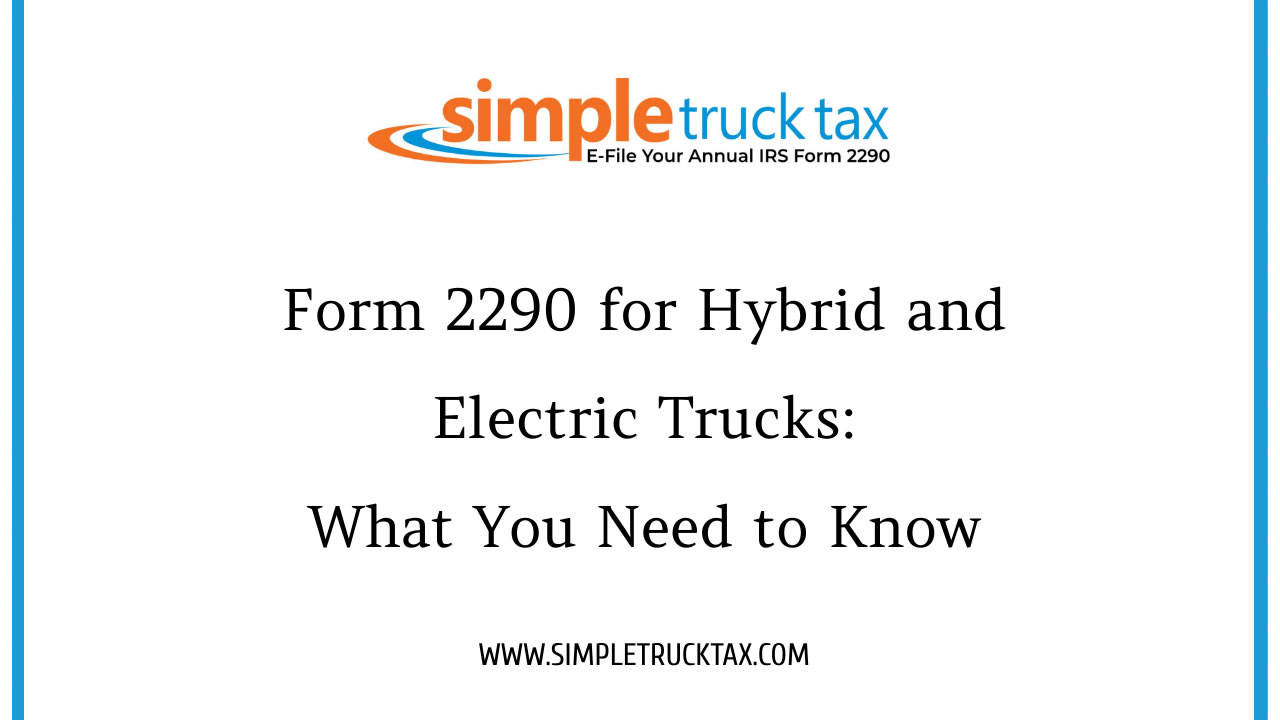
Form 2290 for Hybrid and Electric Trucks: What You Need to Know
Hybrid and Electric Trucks Form 2290: Everything You Need to Know
With the introduction of hybrid and electric trucks, there is a lot of change in the trucking industry, along with new tax and filing requirements. There are rules set for each type of truck, hybrids, and even electric vehicles, through Form 2290, which is popularly known as Heavy Vehicle Use Tax (HVUT). Everything you need to know about filing Form 2290 for these eco-friendly trucks is summarized as follows.
Meaning of Form 2290 and Heavy Vehicle Use Tax (HVUT)
Form 2290 is the IRS's federal tax form, which collects Heavy Vehicle Use Tax from the owners of heavier vehicles weighing over 55,000 pounds. The Heavy Vehicle Use Tax goes into the funding of America's highways and road repairs along with maintenance nationwide. But where things get a little trickier with hybrid and electric trucks and the constant innovation of new technology in this industry.
Do Hybrid and Electric Trucks Need to File Form 2290?
Yes, hybrid and electric trucks do need to file Form 2290 if they weigh over the minimum threshold. The IRS requires HVUT for all trucks, regardless of what kind of fuel is used, if the truck meets the minimum weight threshold. However, there could be special reductions or exemptions that would help electric or hybrid truck owners.
Hybrids and Electric Trucks: How Tax Is Calculated
The calculation of HVUT on hybrids and electric trucks is the same. It depends upon weight and total miles covered in the tax year by public highways. Learn the following factors about hybrids and electric trucks:
Weight- Hybrid and electric vehicles having more than 55,001 pounds are subject to HVUT.
The Exempt ones include:
Vehicles of less than 5,000 miles on them while 7500 for agricultural ones (on which the tax should be paid, but reported as a suspended vehicle).
End
Electric and hybrid trucks often qualify for various tax credit and exemption privileges. Again, these don't quite eliminate the need to file Form 2290 but will more than likely offset a larger portion of the tax:
- Lower Tax Rates: Each state has its discount or credit in place specifically for green vehicles, and all these play a significant role in the amount you pay in HVUT.
- State Specific Incentives: If you run your business in some state, there may be additional incentives because of the utilization of an electric or a hybrid vehicle. Please always refer the state transportation department or the tax office for available credits.
Filing Form 2290 for Hybrid and Electric Trucks
Form 2290 is pretty easy to file and applies to every heavy vehicle including the hybrid or electric trucks:
- Identify the Filing Deadline: Typically, form 2290 is to be filed by August 31 of every year. If a new vehicle is purchased then you have to file for it by the end of the month following the month the vehicle was first used on public highways.
- Gather Vehicle Details: Gather all details such as VIN, gross taxable weight, and mileage records of your vehicle.
- File Online for Ease: The IRS has an option for e-filing Form 2290. More often than not, e-filing is quicker and easier, especially for fleets or trucking companies with multiple vehicles.
Environmental Consequences of Hybrid and Electric Trucks
Hybrid or electric trucks are a way to go green, as they reduce fuel consumption and emission. Hybrid trucks rely on alternative power sources, such as electric batteries, to cut back on fossil fuels. It not only saves the environment but also ensures companies abide by the stricter emissions regulations set in place by many states and cities.
Why Form 2290 Compliance Matters
Proper and timely filing of Form 2290 ensures you are in line with federal tax rules. Non-compliance will put you at risk for paying penalties and additional interest charges, which can sum up quickly. Also, proof of payment from Form 2290 is required when renewing your vehicle registration; hence, keeping your fleet running is essential.
Future Change of HVUT for Hybrid and Electric Trucks
As usage of hybrid and electric trucks grows, so it may also be that future legislation contains specific exceptions or favorable treatments for such vehicles. IRS and other governing bodies are acutely aware of the infrastructural considerations in hybrid vehicles and have already thought about whether changes would be needed to HVUT provisions to accommodate the new realities of 'green' trucks.
All owners of heavy vehicles, from hybrid and electric trucks to those merely running on heavy diesel, will have to file form 2290. Knowing when an exemption might be available, or when a state credit could apply, or when it's time to file the return can really help minimize tax impact on green fleets. Being updated on new developments can always keep you in good standing and ready to capture every possible advantage.
Note: For more information, visit IRS website